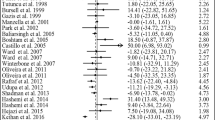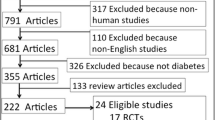Abstract
Vitamin D deficiency is associated with obesity and its associated metabolic disorders, as specified in many epidemiological studies. The assertion that vitamin D can mitigate insulin insensitivity in obese children and adolescents lacks adequate empirical substantiation. Thus, the study utilized some clinical trials on vitamin D interventions to examine the impact of vitamin D supplementation on insulin resistance in obese children and adolescents. The literature was extracted by applying the PRISMA method through electronic databases such as Scopus, Science Direct, Medline, the Cochrane Library, and PubMed from 2012 to 2022. All the articles were in English, and the inclusion criteria for each article were based on the study design and the anthropometric and biochemical parameters of the subjects. A total of 572 research articles were acquired, out of which only seven closely adhered to the inclusion criteria of the study. The studies in this systematic review are based on randomized control trials. The age range of the children in this study spans from 2 to 19 years, and the follow-up period ranges from 3 to 12 months. The range of daily vitamin D doses provided varied from 2000 to 10,000 IU. The results indicate that four randomized controlled trials have demonstrated a positive impact on glycemic parameters, such as insulin levels, fasting blood sugar, and insulin resistance, in the subjects following vitamin D treatment. However, the three trials did not provide sufficient evidence to support a statistically significant effect.
Conclusion: The present review highlights that a significant proportion of the studies incorporated in the analysis demonstrate that the administration of vitamin D may be a preventive measure in ameliorating insulin resistance among pediatric patients with obesity, but it is advisable to implement a prolonged intervention with a substantial sample size and perform micro-level analysis at the gene level to evaluate the impact of vitamin D treatment.
What is known: • Childhood obesity and its associated metabolic disorder is a concerned global problem. • Several studies showed an association of vitamin D deficiency with adiposity- induced metabolicdisorders which are still controversial. This study focused on finding interlink between vitamin Dsupplementation with obesity induced insulin resistance in children and adolescents. | |
What is new: • This study supports that high dosage of Vitamin D in long term may be protective against insulinresistance in obese paediatric individuals. • A new factor is also reported in the study that vitamin D may alter the composition of gut microbiotawhich represents a compelling approach to the therapeutic management of obesity and diabetes. |

Similar content being viewed by others
References
Ding YC, Li X, Xu Z, Li C, Jia L (2023) Low vitamin D during pregnancy is associated with infantile eczema by up-regulation of PI3K/AKT/mTOR signaling pathway and affecting FOXP3 expression: a bidirectional cohort study. J Nutr Biochem 109516. https://doi.org/10.1016/j.jnutbio.2023.109516
Carlberg C (2019) Vitamin D: a micronutrient regulating genes. Curr Pharm Des 25(15):1740–1746. https://doi.org/10.2174/1381612825666190705193227. (PMID: 31298160)
Fu J, Han L, Zhao Y, Li G, Zhu Y, Li YY, Li M, Gao S, Willi SM (2019) Vitamin D levels are associated with metabolic syndrome in adolescents and young adults: the BCAMS study. Clin Nutr 38(5):2161–2167. https://doi.org/10.1016/j.clnu.2018.08.039
Pangestu YM, Antolis A, Pateda V, Kristellina, Warouw SMS (2016) Perbandingan Kadar Gula Darah Puasa pada Anak Obes dengan Resistensi insulin dan Tanpa Resistensi insulin. Sari Pediatr 15:161
Wortsman J, Matsuoka LY, Chen TC, Lu Z, Holick MF (2000) Decreased bioavailability of vitamin D in obesity. Am J Clin Nutr 72(3):690–693. https://doi.org/10.1093/ajcn/72.3.690
Global Atlas on Childhood Obesity | World Obesity Federation. (n.d.). World Obesity Federation. https://www.worldobesity.org/membersarea/global-atlas-on-childhood-obesity
Pereira MFR, De Farias Costa PR, Pereira EC, De Lima Lago IR, Oliveira AC (2021) Does vitamin D deficiency increase the risk of obesity in adults and the elderly? A systematic review of prospective cohort studies. Public Health 190:123–131. https://doi.org/10.1016/j.puhe.2020.04.031
Sindhughosa DA, Wibawa IDN, Mariadi IK, Somayana GSSG (2022) Additional treatment of vitamin D for improvement of insulin resistance in non-alcoholic fatty liver disease patients: a systematic review and meta-analysis. Sci Rep 12(1). https://doi.org/10.1038/s41598-022-11950-x
Moher D, Liberati A, Tetzlaff J, Altman DG (2009) Preferred Reporting Items for Systematic Reviews and Meta-analyses: the PRISMA Statement. Ann Intern Med 151(4):264. https://doi.org/10.7326/0003-4819-151-4-200908180-00135
Holick MF (2009) Vitamin D status: measurement, interpretation, and clinical application. Ann Epidemiol 19(2):73–78. https://doi.org/10.1016/j.annepidem.2007.12.001
Holick MF (2007) Vitamin D deficiency. N Engl J Med 357(3):266–281. https://doi.org/10.1056/nejmra070553
Verhagen AP, De Vet HC, De Bie RA, Kessels AG, Boers M, Bouter LM, Knipschild P (1998) The Delphi list. J Clin Epidemiol 51(12):1235–1241. https://doi.org/10.1016/s0895-4356(98)00131-0
Sterne JaC, Savović J Page MJ, Elbers RG, Blencowe NS, Boutron I, Cates CJ, Cheng H, Corbett MA, Eldridge S, Emberson J, Hernán MA, Hopewell S, Hróbjartsson A, Junqueira DR, Jüni P, Kirkham JJ, Lasserson TJ, Li T, Higgins JPT (2019) RoB 2: a revised tool for assessing risk of bias in randomised trials. BMJ l4898. https://doi.org/10.1136/bmj.l4898
Samaranayake D, Adikaram SGS, Atapattu N, Kendaragama KMDLD, Senevirathne JTN, Jayasekera HD, Wickramasinghe VP (2020) Vitamin D supplementation in obese Sri Lankan children: a randomized controlled trial. BMC Pediatrics 20(1). https://doi.org/10.1186/s12887-020-02329-w
Varshney S, Khadgawat R, Gahlot M, Khandelwal D, Oberoi A, Yadav R, Sreenivas V, Gupta N, Tandon N (2019) Effect of high-dose vitamin D supplementation on beta cell function in obese Asian-Indian children and adolescents: a randomized, double blind, active controlled study. Indian J Endocrinol Metab 23(5):545. https://doi.org/10.4103/ijem.ijem_159_19
Brar PC, Contreras ME, Fan X, Visavachaipan N (2018) Effect of one time high dose “stoss therapy” of vitamin D on glucose homeostasis in high risk obese adolescents. AE&M. https://doi.org/10.20945/2359-3997000000024
Kelishadi R, Salek S, Salek M, Hashemipour M, Movahedian M (2014) Effects of vitamin D supplementation on insulin resistance and cardiometabolic risk factors in children with metabolic syndrome: a triple-masked controlled trial. J Pediatr 90(1):28–34. https://doi.org/10.1016/j.jped.2013.06.006
Belenchia AM, Tosh AK, Hillman LS, Peterson CC (2013) Correcting vitamin D insufficiency improves insulin sensitivity in obese adolescents: a randomized controlled trial. Am J Clin Nutr 97(4):774–781. https://doi.org/10.3945/ajcn.112.050013
Javed A, Vella A, Balagopal P, Fischer PR, Weaver AL, Bergman RN, Man CD, Cobelli C, Giesler PD, Laugen J, Kumar S (2015) Cholecalciferol supplementation does not influence β-cell function and insulin action in obese adolescents: a prospective double-blind randomized trial. J Nutr 145(2):284–290. https://doi.org/10.3945/jn.114.202010
Rajakumar K, Moore CG, Khalid AT, Vallejo AN, Virji MA, Holick MF, Greenspan SL, Buchanan TA, Reis SE (2020) Effect of vitamin D3 supplementation on vascular and metabolic health of vitamin D–deficient overweight and obese children: a randomized clinical trial. Am J Clin Nutr 111(4):757–768. https://doi.org/10.1093/ajcn/nqz340
Bouillon R, Carmeliet G, Verlinden L, Van Etten E, Verstuyf A, Luderer HF, Lieben L, Mathieu C, Demay MB (2008) Vitamin D and human health: lessons from vitamin D receptor null mice. Endocr Rev 29(6):726–776. https://doi.org/10.1210/er.2008-0004
Leung PS (2016) The potential protective action of vitamin D in hepatic insulin resistance and pancreatic islet dysfunction in type 2 diabetes mellitus. Nutrients 8(3):147. https://doi.org/10.3390/nu8030147
Christakos S, Liu Y (2004) Biological actions and mechanism of action of calbindin in the process of apoptosis. J Steroid Biochem Mol Biol. https://doi.org/10.1016/j.jsbmb.2004.03.007
Contreras-Bolívar V, García-Fontana B, García-Fontana C, Muñoz-Torres M (2021) Mechanisms involved in the relationship between vitamin D and insulin resistance: impact on clinical practice. Nutrients 13(10):3491. https://doi.org/10.3390/nu13103491
Yeow TP, Lim SL, Hor CP, Khir ASM, Mohamud WNW, Pacini G (2015) Impact of vitamin D replacement on markers of glucose metabolism and cardio-metabolic risk in women with former gestational diabetes—a double-blind, randomized controlled trial. PLoS ONE 10(6):e0129017. https://doi.org/10.1371/journal.pone.0129017
Asemi Z, Foroozanfard F, Hashemi T, Bahmani F, Jamilian M, Esmaillzadeh A (2015) Calcium plus vitamin D supplementation affects glucose metabolism and lipid concentrations in overweight and obese vitamin D deficient women with polycystic ovary syndrome. Clin Nutr 34(4):586–592. https://doi.org/10.1016/j.clnu.2014.09.015
Thams L, Stounbjerg NG, Hvid LG, Mølgaard C, Hansen M, Damsgaard CT (2022) Effects of high dairy protein intake and vitamin D supplementation on body composition and cardiometabolic markers in 6–8-y-old children—the D-pro trial. Am J Clin Nutr 115(4):1080–1091. https://doi.org/10.1093/ajcn/nqab424
Cho KY (2023) Association of gut microbiota with obesity in children and adolescents. Clin Exp Pediatr (Online) 66(4):148–154. https://doi.org/10.3345/cep.2021.01837
Palmas V, Pisanu S, Madau V, Casula E, Deledda A, Cusano R, Uva P, Vascellari S, Loviselli A, Manzin A, Velluzzi F (2021) Gut microbiota markers associated with obesity and overweight in Italian adults. Sci Rep 11(1). https://doi.org/10.1038/s41598-021-84928-w
Гpигopьeвa ИH (2020) Gallstone disease, obesity and the Firmicutes/Bacteroidetes ratio as a possible biomarker of gut dysbiosis. J Pers Med 11(1):13. https://doi.org/10.3390/jpm11010013
Magne F, Gotteland M, Gauthier L, Zazueta A, Pesoa S, Navarrete P, Balamurugan R (2020) The Firmicutes/Bacteroidetes ratio: a relevant marker of gut dysbiosis in obese patients? Nutrients 12(5):1474. https://doi.org/10.3390/nu12051474
Ahmad J, Khan I, Zengin G, Mahomoodally MF (2023) The gut microbiome in the fight against obesity: the potential of dietary factors. FASEB J 37(11). https://doi.org/10.1096/fj.202300864rr
Bellerba F, Muzio V, Gnagnarella P, Facciotti F, Chiocca S, Bossi P, Cortinovis D, Chiaradonna F, Serrano D, Raimondi S, Zerbato B, Palorini R, Canova S, Gaeta A, Gandini S (2021) The association between vitamin D and gut microbiota: a systematic review of human studies. Nutrients 13(10):3378. https://doi.org/10.3390/nu13103378
Sukik A, Alalwani J, Ganji V (2023) Vitamin D, gut microbiota, and cardiometabolic diseases—a possible three-way axis. Int J Mol Sci 24(2):940. https://doi.org/10.3390/ijms24020940
Acknowledgements
I would like to thank the anonymous referees for their useful suggestions.
Author information
Authors and Affiliations
Contributions
Ayushi Singh performed writing—original draft and conceptualization. Neetu Singh performed writing—review, editing, and conceptualization.
Corresponding author
Ethics declarations
Conflict of interest
The authors declare no competing interests.
Additional information
Communicated by Peter de Winter
Publisher's Note
Springer Nature remains neutral with regard to jurisdictional claims in published maps and institutional affiliations.
Rights and permissions
Springer Nature or its licensor (e.g. a society or other partner) holds exclusive rights to this article under a publishing agreement with the author(s) or other rightsholder(s); author self-archiving of the accepted manuscript version of this article is solely governed by the terms of such publishing agreement and applicable law.
About this article
Cite this article
Singh, A., Singh, N. Vitamin D intervention as a curative measure for glucose intolerance in obese children and adolescents: a systematic review on randomized control trials. Eur J Pediatr 183, 1475–1483 (2024). https://doi.org/10.1007/s00431-023-05407-0
Received:
Revised:
Accepted:
Published:
Issue Date:
DOI: https://doi.org/10.1007/s00431-023-05407-0




